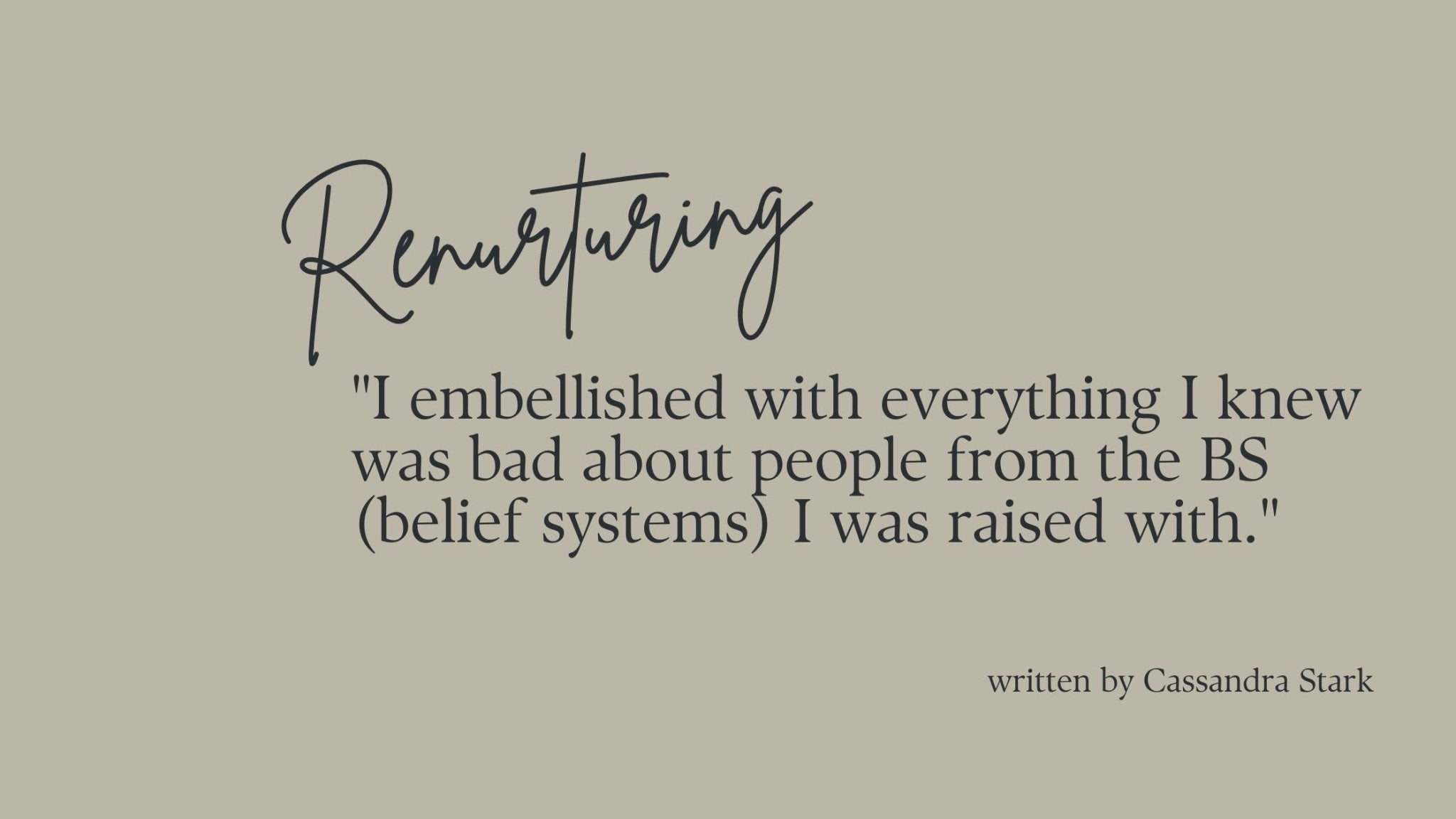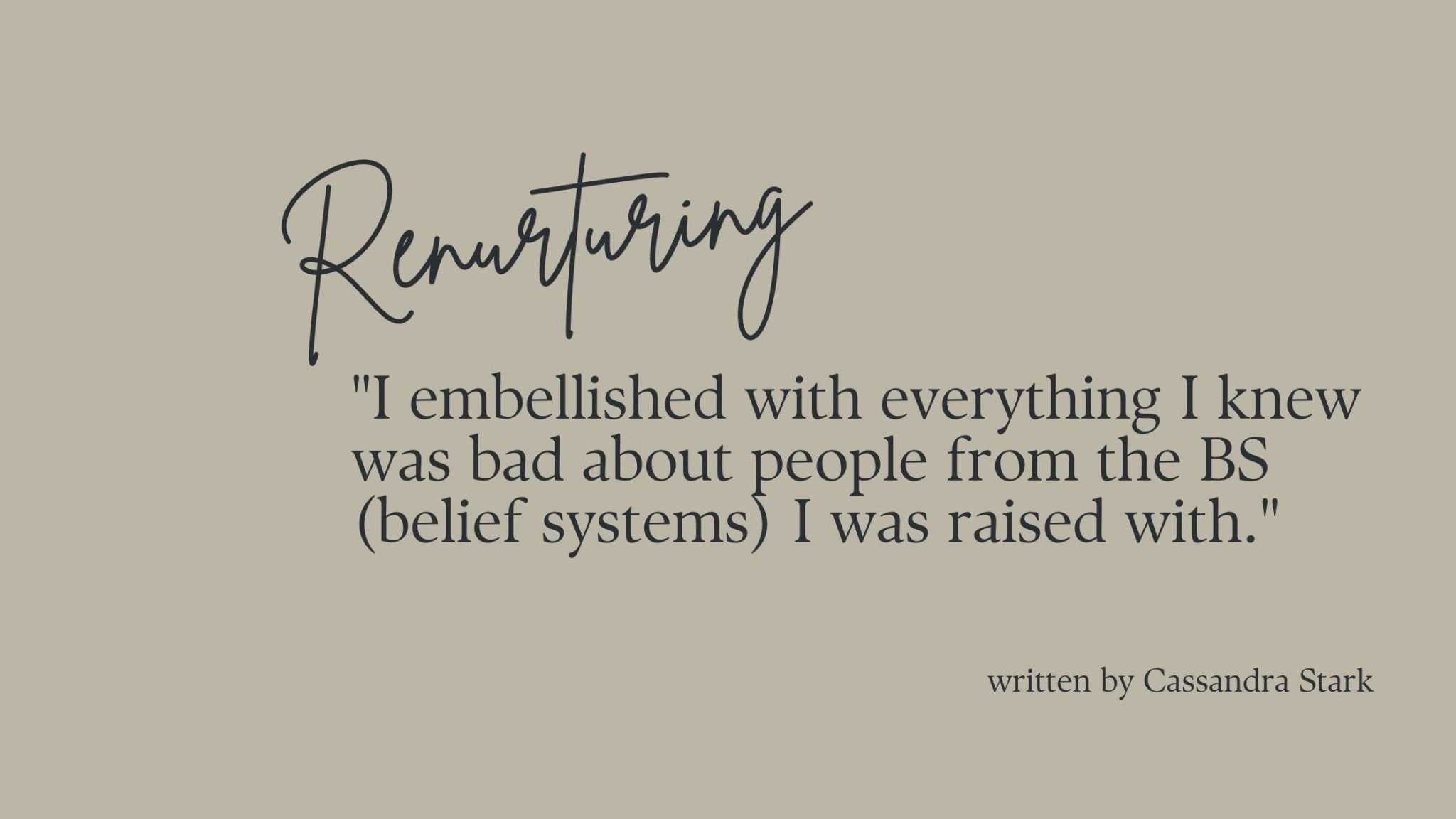In psychotherapy, reparenting is when your therapist takes on the role of a trusted and concerned parent to exemplify what a trustworthy interaction would be. I have a great example of this.
Growing up, there was a terrible incident that never quite made sense to me as an adult. In second grade, I had gone to my mother, overwhelmed with tears and the fear of getting in trouble because I had a pretty serious hole in the edge of my tiny, stretch-waist acid-wash jeans. I told her that I was at school in the play yard. I had wandered into the woods without my best friends, only to find two high school students who jumped me, tied me to a tree, threatened me with a knife, and cut my pants as a warning. I described the two boys down to their hair and their T-shirts.
I don’t know if my mother was ever suspicious of my story. When I think back on seven-year-old children that have shared their convincing truths with me, it has been more adorable than realistic. This, under any circumstances, was not an adorable story. I have to think that my mother believed me based on what happened next.
She involved the local police. This may have been a ruse because she worked at the police station at the time.
A tall, caring gentleman dressed in regular slacks and a button-up shirt came to our house and spent what felt like hours going through local high school yearbooks with me, asking me to point out anyone who looked familiar.
I wasn’t doing it for the attention. In fact, I was doing it to get all of the attention off of me for being at fault for ruining my pants and blaming something else that I thought was very believable. However, in hindsight, the calm, soothing tones of this unfamiliar face and the time the cop put into our shared concern to hear me and let me express what it was that I needed without criticism and judgment were absolutely foreign to me. It felt nice.
Because my mother has since passed away, taking all her motherly secrets with her, I have no idea if all of this was just a ploy to teach me a lesson. Whether or not it was isn’t actually what matters. What is most telling is that even as an adult, the memory of my upbringing was so untrustworthy to me that I can’t even fathom that all of this wasn’t staged to make me feel as guilty and terrible as possible.
So, as the supposed cop spent more and more time with me, I started to feel like I was in even bigger trouble for wasting an adult’s time. Sure it felt nice for a minute to be cared for and have someone willing and wanting to understand me, but even then, it felt incredibly suspicious. I don’t trust anyone showing up for me. What does he want?
Since this started, my mom had me sleeping on a loveseat in my parent’s room. With one eye open, watching her move back and forth, cleaning in the late morning light, I timed it perfectly to jump straight out of my makeshift bed just like in the movies and announce with Oscar-winning prowess, “It was just a dream!”
Almost 30 years later, I sat telling my good friend and therapist this story, not with any particular need in mind but understanding that so many factors were wrong with this situation.
I explained to him, “First of all, how would a 7-year-old even know to tell a story like that? Second, I clearly had a serious need to be believed and cared for, so much so that I don’t think I fabricated this story out of thin air, I believe I was trying to tell them something by purposefully conflating multiple situations into one story.”
I described their T-shirts with skulls and Simpsons characters. All black! Long hair. I embellished with everything I knew was bad about people from the BS (belief systems) I had been raised with. I wanted to express with a believable story that these kids were bad. Very bad. Because I felt that bad.
The truth was, I had somehow managed to cut my pants on the swings. My miniature acid-wash jeans with the elastic waist had somehow been pinched by the chains that attached to the swing at hip level, and as I swung back and forth, they worked their way into a greasy hole. I confessed once the cop said he would be taking my jeans to “the lab” to run a forensic test and see exactly what kind of knife had cut them. I felt caught by forensic science, just like those damned TV shows!
To be clear, I had no agenda in telling my therapist this story other than to scoff at the fact that something was clearly going on in a 7-year-old girl’s life, and nobody cared to get on my level and ask me what was really going on. Instead, it was more important to teach me a lesson. This is a mistake that leaves me cringing with familiar pain when other parents share with me blaming, anxious-filled stories about the “attention” their children are trying to get by “ruining their _____.”
I continued the story and explained that my mom took me back to school after the “it’s a dream” incident and forced me, shaking in my velcroed shoes, to tell the principal very specifically that I had lied.
The principal, overwhelmed with serious disappointment, leaned into it and told me, “I fired the playground attendant because of you.” Imagine the horror and responsibility of a little girl staring at the floor, wringing her hands together in dire nervousness. At the same time, she cried a silent, snot-dripping cry that no one would even give her a Kleenex for because, as far as she was concerned, she deserved to have snot running down her lips and drying to her frozen quivering chin.
I described this to my therapist with almost a laugh – understanding as a 30-year-old-something that this was all kinds of fucked up and certainly caused me to repress the real truth of the matter out of insane amounts of shame and fear. Because the truth is, I can take you to the exact tree where this happened. Yes, it was not a knife that cut my pants that day, but there was a very real tree and two very real boys that I was describing with very real fear, even if it was a confession fabricated long after the fact when I felt that finally, I had a reason to be heard and believed. The pants.
Like my seven-year-old self, I paused and stared at the ground, this time without tears. I could still feel the crust of dried snot across my face, and the uncontrollable guilt felt in the face of blatant adult shaming.
Suddenly, my therapist touched my knee ever so slightly to bring me back to the moment. He looked directly into me with big eyes and said, “Are you ok? Did someone hurt you?” I was bewildered. Silent. He continued, “Do you need a bandaid and a hug?”
It was the end of our session. He stood up and hugged me completely. No agenda. No assumptions. No guilt. No criticism. And with tears choking through his voice, he exclaimed, “You are more important than a God damned pair of pants.”
Case. Closed.
In this absolute Good Will Hunting, “It’s not your fault…” moment, I felt healing begin to radiate through me. This was an important, pivotal moment in my psychotherapy. Reparenting
Since then, I have learned to take my truth and my adult understanding to new levels. I utilize my grown-up knowledge, and my hindsight is 20/20 understanding to actively reparent myself. This was just the beginning of my studies on attachment, trauma, neglect, body memories, flashbacks, and BS (belief systems). I have put a summary of all this knowledge into the Renurturing Pocket Guide – an Advanced guide for BeMo journalers who are already well-practiced and familiar with the BeMo process.
Not every story will manifest an exact truth or allow you to prove “that happened.” In the end, that isn’t. what matters. In your renurturing practice, what matters is showing up for your inner child to provide the unmet needs experienced at that moment; the same unmet needs that creep in with the potential to infect your adult life with a tendency to survive and defend in Lion-free moments – fight, flight, freeze, or faint. There are no experiences too big or too small. For any story you experience on repeat, this is your mind and body insisting that you please take one more look. Revisit and renurture. Show up for yourself.









Leave a comment